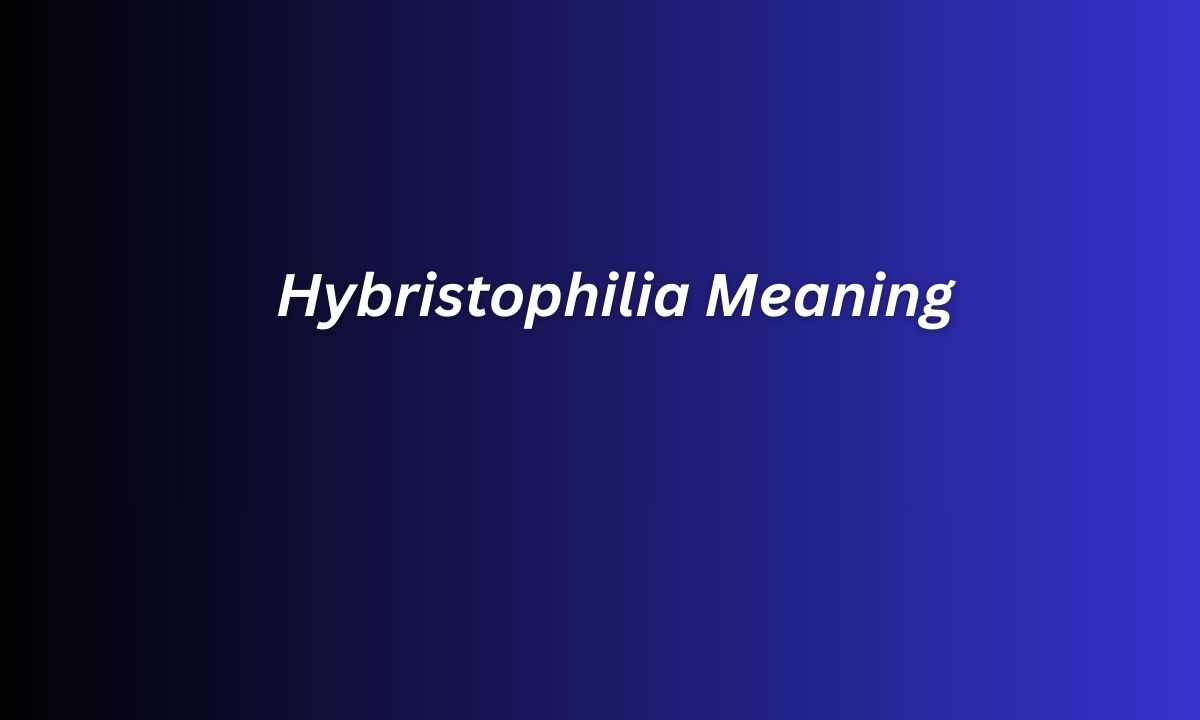Hybristophilia meaning often sparks curiosity due to its unusual combination of psychological and linguistic roots. It is not a word used in everyday conversation, yet it carries significant weight in both academic and social discussions, especially when exploring human attraction and behavior.
In its simplest form, hybristophilia refers to a psychological condition where individuals experience attraction to people who commit crimes or display antisocial behavior. While it sounds unsettling, understanding hybristophilia meaning helps in recognizing complex aspects of psychology and communication.
This article will explain hybristophilia meaning in depth, explore how it is used in text and conversation, and provide nuanced alternatives for polite, professional, and casual use of language. Additionally, we will compare it with related expressions such as hiatus meaning, offering readers a range of refined vocabulary.
Hybristophilia Meaning
Hybristophilia is a psychological term describing a specific type of attraction where individuals are drawn to those who commit crimes, especially violent ones. The word is rooted in Greek: hubris (pride or violence) and philia (love or strong preference).
In psychology, hybristophilia has been discussed in relation to infamous cases where criminals receive fan mail, marriage proposals, or strong support from admirers. This phenomenon highlights a paradox of human desire, where danger and rebellion are sometimes perceived as fascinating.
From a linguistic perspective, hybristophilia meaning is not just confined to psychology. It also appears in popular culture, media, and social conversations, often used to describe an unusual or controversial attraction. While rare, it remains a word that provokes curiosity whenever encountered.
Hybristophilia Meaning in Text
When used in text, hybristophilia usually refers to a psychological condition rather than a casual description of attraction. Writers often employ the term in criminology studies, psychological journals, or news articles about notorious figures.
For example, a sentence might read: “The media highlighted hybristophilia meaning by showing how certain individuals expressed admiration for the convicted criminal despite their violent actions.” Here, the term provides precision and avoids vague descriptions.
In everyday usage, however, the word can feel heavy and overly clinical. This is why understanding hybristophilia meaning and knowing alternatives or softer phrasing becomes useful when engaging in different contexts, especially when politeness or professionalism is required.
Exploring Alternatives to “Hiatus Meaning”
Since this article also compares hybristophilia meaning with hiatus meaning, it’s essential to recognize that “hiatus” refers to a pause, break, or interruption. People often search for alternatives to avoid repetition or to adjust tone.
Alternatives depend on context: in a professional setting, one might prefer “intermission” or “suspension,” while in casual conversation, terms like “time-out” or “pause” feel friendlier. The choice of word reflects not just accuracy but also the level of formality.
By drawing parallels between hybristophilia meaning and hiatus meaning, we see how language offers precise yet flexible choices. Words hold power in shaping tone, and exploring alternatives ensures communication feels natural, polite, and tailored to the situation.
Polite Alternatives to “Hiatus”
When aiming for respectful and refined communication, here are some polite alternatives to hiatus meaning:
- Intermission – A temporary pause, often used in formal contexts.
- Suspension – Suggests an intentional pause, common in professional discussions.
- Interval – A gentle, neutral term often used in meetings or events.
- Adjournment – Commonly used in legal or formal gatherings.
- Respite – Conveys a pause that provides relief or rest.
These words work best when discussing structured environments like education, workplaces, or formal events. For example, “The board meeting entered an intermission for fifteen minutes.”
Professional Alternatives to “Hiatus”
In professional writing or workplace discussions, the tone often requires clarity without sounding abrupt. Here are professional substitutes:
- Break in proceedings – Direct but formal.
- Interruption – Clear and businesslike.
- Moratorium – Often used in policy or legal contexts.
- Cessation – Formal, sometimes technical.
- Gap – Professional yet straightforward.
Example: “The project experienced a temporary moratorium due to budget constraints.” This wording maintains professionalism while clarifying the nature of the pause.
Casual Alternatives to “Hiatus”
For everyday conversations, softer and more approachable language works better. Here are casual alternatives:
- Pause – Friendly and neutral.
- Time-out – Relaxed, conversational, often used informally.
- Break – Common, approachable, and widely understood.
- Breather – Suggests taking a short rest.
- Lull – Indicates a quiet or calm period in activity.
For example: “Let’s take a quick breather before continuing the game.” Such phrasing feels natural in casual discussions with friends, family, or peers.
How to Choose the Best Alternative
The decision between “hiatus” and its alternatives depends on three factors: audience, tone, and purpose. In academic or professional writing, a word like moratorium or suspension conveys authority. In casual use, pause or breather feels more natural and friendly.
Context shapes perception. If a manager tells employees, “There will be a suspension of work,” it sounds more formal than saying, “We’re taking a short break.” Both are correct, but each creates a different impression.
Therefore, understanding hybristophilia meaning and hiatus meaning highlights the broader principle: word choice is not just about dictionary definitions but also about nuance, tone, and appropriateness.
Conclusion
Hybristophilia meaning uncovers a fascinating aspect of human psychology, linking attraction to dangerous or antisocial individuals. While the term is technical, its presence in media and everyday language shows how unusual concepts enter broader conversations.
By contrasting hybristophilia with hiatus meaning, we explore not only psychology but also the power of language. Words like intermission, respite, pause, or breather show that alternatives exist for every context, whether formal or casual.
Ultimately, communication improves when we choose words carefully. Understanding hybristophilia meaning in text, as well as finding appropriate alternatives to common phrases, allows us to express ideas with precision, politeness, and clarity across all settings.

Elizabeth crafts heartfelt messages for every occasion—anniversary wishes, love notes, prayers, thank-yous, and inspirational greetings—bringing warmth, joy, and connection to your special moments.










